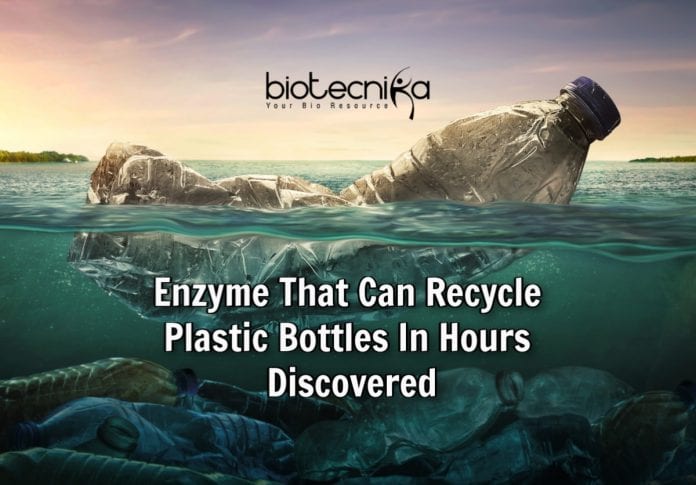Enzyme To Recycle Plastic Bottles Developed By Carbios
Scientists have developed a mutant bacterial enzyme that breaks down plastic bottles for recycling in hours.
Plastic bottles can be reduced to chemical building blocks using this new enzyme found in a compost heap of leaves. These building blocks can be used to make high-quality new bottles. Currently, plastic can be recycled to produce only carpets and clothing.
The company behind the breakthrough discovery, Carbios, is aiming for industrial-scale recycling within five years. Companies like L’Oréal and Pepsi have collaborated with Carbios to accelerate the development. The new enzyme is a major advance, according to independent experts.
From the Arctic to the deepest ocean trench, billions of tonnes of plastic waste have polluted the planet, posing a high risk to sea life. The company said the use of lightweight but strong plastic and their true recycling is the solution for this. However, campaigners say the key solution would be reducing the use of plastic.
The journal Nature published the research on Wednesday. Researchers screened 100,000 micro-organisms, including the leaf compost bug for promising candidates. The leaf compost bug discovered in 2012, turned out to be the best.
Scientists introduced mutations to the
enzyme to improve its ability to break down the PET plastic used for making bottles. To enable fast degradation, they made the enzyme stable at 72C.The team found that a tonne of waste plastic bottles were 90% degraded within 10 hours when the optimized enzyme was used to breakdown them.
Novozyme will collaborate with Carbios to scale up the production of the new enzyme using fungi. The enzyme would cost 4% of virgin plastic made from oil. The PET plastic bottles will be more expensive than virgin plastic because they have to be ground up and heated before the enzyme is added.
Due to the shortage of supply, existing lower-quality recycled plastic sells at a premium, said Martin Stephan, the deputy chief executive at Carbios.“We are the first company to bring this technology on the market, our goal is to be up and running by 2024, 2025, at large industrial scale,” he added.
One part of solving the waste problem was reducing the use of plastic. But plastic is inevitable in medical care, transportation, and food. About half of the plastic ends up in the environment or in the landfill. So increasing the collection of plastic could be a major solution.
Prof John McGeehan, the director of the Centre for Enzyme Innovation at the University of Portsmouth, whose team had accidentally created an enzyme in 2018 that breaks down or recycle plastic drinks bottles, said the new work is a major advance.
Scientists are also trying to discover biological ways to break down other types of plastic. A bug that feasts on toxic polyurethane were discovered in March by German scientists. Earlier researches have also shown that wax moth larvae can eat up polythene bags.






























